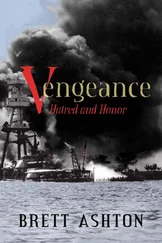“It’s— it used to be —Lufthansa’s terminal. Good airport. I could get the Connie into it with no trouble.”
If Aragão was curious to know how an SAA pilot knew so much about Tempelhof, he was too prudent to ask. But von Wachtstein saw the look on his face. And so did Frade.
“Fernando,” Clete said, “say hello to Special Agent Peter von Wachtstein of the OSS, formerly major of the Luftwaffe. Peter, Fernando is the OSS station chief here.”
Aragão didn’t reply but looked at Boltitz.
Clete went on: “And Special Agent Karl Boltitz used to be Kapitän zur See of the Kriegsmarine. When we get to Germany, he’s going to see what his U-boat buddies can tell us about all these submarines that Mr. Dulles tells us are supposed to be headed for Argentina.”
“Damn it,” Aragão suddenly exclaimed.
Clete looked on curiously as Aragão stabbed his right hand into his suitcoat and came out with a sealed envelope.
“This came for you earlier, Clete. There’ve been fifty different stories making the rounds about those subs, each harder to swallow than the other. And I’m not sure this helps.”
Frade took the envelope, opened it, and extracted the single page inside. His eyes fell to it: PRIORITY
TOP SECRETDUPLICATION FORBIDDEN
FROM AGGIE
TO TEXVIA OSS LISBON STATION
MSG NO 412 1805 GREENWICH 16 MAY 1945
LAST NIGHT—15 MAY—DAVID BRUCE DISPATCHED FOUR AGENTS FROM OSS LONDON STATION TO BERGEN NORWAY TO INTERVIEW SIXTEEN (16) GERMAN POWS BEING HELD THERE. OUR INFORMATION IS THAT CAPTAIN SCHAFFER OF U-977 GAVE HIS MARRIED CREWMEN THE OPTION OF CONTINUING ABOARD OR BEING PUT ASHORE IN EUROPE TO REJOIN THEIR FAMILIES. ON 10 MAY THE TOTAL OF NINETEEN (19) WHO TOOK HIM UP ON THE OFFER WENT ASHORE BY DINGHY AT HOLSENOY ISLAND NORWAY. SIXTEEN (16) SURRENDERED TO BE REPATRIATED. THREE (3) REMAIN AT LARGE.
IN INITIAL INTERVEWS NONE OF THE POWS SAID THEY HAD SEEN ANYBODY ONBOARD OTHER THAN FELLOW SUBMARINERS.
FURTHER, MARSHAL ZHUKOV IN BERLIN REPORTS THAT RUSSIAN AGENTS HAVE THE CHARRED REMAINS OF HITLER AND HIS BRIDE AS WELL AS THE GOEBBELS FAMILY AND OTHERS. ZHUKOV SAID THE REMAINS WERE RECOVERED OUTSIDE THE FUHRERBUNKER, IN THE REICH CHANCELLERY GARDEN. WHILE THE RUSSIANS ARE NOT EXACTLY BEING PARAGONS OF HONESTY WE HAVE NO REASON NOT TO BELIEVE THEM IN THIS INSTANCE.
MEANTIME SCORES OF ATTACK U-BOATS HAVE FOLLOWED THE ORDER OF ADMIRAL DONITZ TO STAND DOWN AND SURRENDER WITH THEIR CREWS. OPERATION DEADLIGHT WILL SEE THESE VESSELS SCUTTLED. U-977 AND U-234 ARE NOT AMONG THOSE HAVING SURRENDERED AND THEIR WHEREABOUTS AND ANY POSSIBLE TANKER U-BOATS REMAIN UNKNOWN. WE CAN ONLY PRESUME THEY CONTINUE EN ROUTE TO ARGENTINA. GEN BENDICK HAS BEEN ALERTED.
WILL LET YOU KNOW WHAT WE LEARN FROM U-977 POWS IN NORWAY. LET ME KNOW WHAT IF ANYTHING YOUR U-BOAT EXPERT LEARNS THERE. THAT SAID, IT MAY OR MAY NOT MATTER—WILD BILL SUSPECTS OUR LITTLE ORGANIZATION COULD BE OUT OF BUSINESS SOONER THAN EXPECTED.
TEX
END
TOP SECRET DUPLICATION FORBIDDEN
Frade shook his head, then folded the sheet and stuffed it in his pocket.
“When the hell is ‘sooner than expected’?” he said. He shook his head, then looked at Aragão and added, “Well, the only thing we know for sure now is that at least one U-boat is headed for Argentina. I never believed that Hitler was aboard. I also don’t buy the story that there’s a fleet of U-boats. Maybe one or two, and some tankers. Then again, maybe not. Karl should be able to get us some answers.”
Aragão nodded. He said: “Where did the general at Val de Cans get his intel about this ‘rescue the diplomats’ operation you’re on being a cover to get Nazis out of Germany?”
“From me,” Clete said. “I wasn’t being exactly truthful with the ambassador. Something about this smells, starting with why are these Argentine diplomats still in Berlin? Argentina declared war on Germany on March twenty-seventh—that’s almost two months ago. They could have been in neutral Sweden that night, or the next day. Or in Spain the day after that. They stayed because they wanted to, and I don’t mean for the joy of watching Russian T-34 tanks roll down . . . what’s the wonderful name of that street? The Unter den Linden. They stayed for a reason.”
“What kind of a reason?” Delgano asked.
“Any of a number of reasons. For example, suppose you were Heinrich Himmler and you had a couple of kilograms of diamonds you wanted to get to Argentina. Wouldn’t it make more sense to give a quarter of them, or even half, to some friendly Argentine diplomat in exchange for his taking them to Argentina for you? Submarines get sunk.”
“You think that’s what it is?”
“I don’t know, but if the secretary of Labor and Retirement Plans—my beloved Tío Juan—is involved, it’s entirely likely. And we know he’s involved because his good friend Nulder is in charge of the rescue mission.”
“But you implied,” Aragão said, “that they were going to try to smuggle Nazis back on your airplane.”
“They may have had that in mind. Maybe just one or two really big Nazis. Who’s going to count heads on a mercy flight? But I don’t think so, now that I’ve led Nulder and Ambassador Hernández to believe the Americans are onto them. But precious stones, or something else? That wouldn’t surprise me at all. Who’s going to search the luggage of a rescued diplomat?”
“So that’s what that was all about,” Delgano said.
“I’m an evil man, Gonzo. You’ve said so yourself.”
“So, what happens now?” Delgano asked.
“First, we finish this bottle of wine, and then maybe another, and then we have dinner and a bath, not necessarily in that order.”
“I meant tomorrow, Cletus,” Delgano said, shaking his head in resignation.
“We wait for the flyover clearances. We can’t go to Berlin without them.”
Hotel Britania Rua Rodrigues Sampaio 17 Lisbon, Portugal 1705 18 May 1945
Ambassador Claudio de Hernández was sitting at the hotel’s bar with Fernando Aragão when Frade, Delgano, Stein, Vega, and Peralta walked in.
Stein deposited a heavy, dripping burlap sack on the bar.
The barman appeared, looking askance at the burlap bag.
“Where have you been all day?” Ambassador de Hernández asked. “We’ve been looking all over for you.”
“Have a sniff of the bag and take a guess,” Frade said.
“I beg your pardon?”
Frade sniffed loudly and pointed at the burlap sack.
“After you pour us a little of that splendid Altano Douro 1942,” Frade ordered the barman, “please ask the chef to join us.”
Aragão sniffed the bag and smiled.
“I really thought you were kidding,” he said.
“I never kid about whiskey, women, or fishing,” Frade said. “Aside from Vega getting a little seasick, everything went . . . swimmingly .”
“You have been fishing?” Ambassador de Hernández asked incredulously. “In the ocean?”
“That’s where the fish usually are, Mr. Ambassador.” Frade then added, “You’re in luck, Fernando. There’s even enough for the ambassador and the diplomats.”
The chef, an enormous fat man in stained kitchen whites, appeared.
“Slide Siggie that tray, Mario,” Frade ordered, pointing down the bar. “Siggie, put a sample of our fruits of the sea on the tray for the chef’s edification.”
Stein dipped into the bag, came out with three large fish fillets, and arranged them on the tray.
The chef bent over and sniffed them, then punched them with his index finger.
“Caballa,” he said.
“Yes,” Frade said. “In English, they say ‘mackerel.’ These are from what a norteamericano would call a ‘king mackerel.’”
Читать дальше












